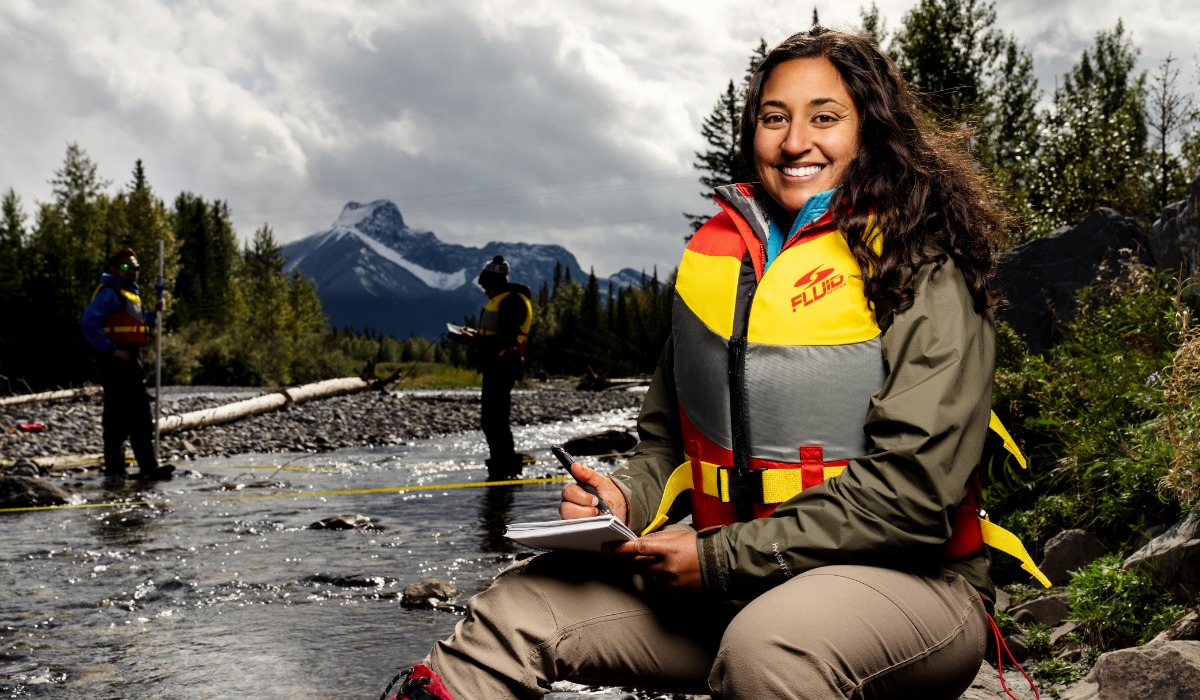Overview
Forge your path in the oil and gas sector with the Land Analyst certificate, an online program designed to provide you with the essential skills and knowledge needed to manage and coordinate land administration tasks effectively.
This ten-course credit program is tailored for those looking to make an impact by bridging the gap between corporations, landowners, regulatory bodies and government entities.
Your learning journey covers all aspects of surface land administration. The curriculum is crafted to give you direct knowledge and experience, enabling you to apply learned concepts directly to real-world scenarios.
In this program, you will:
- master land administration concepts and practices
- gain proficiency in liaising between various stakeholders in the oil and gas industry
- learn how to manage and maintain accurate land and lease records
- gain expertise in coordinating data and projects and ensuring regulatory and environmental compliance
- develop competence in managing relationships within communities affected by energy projects
- grasp the evolving landscape of renewable energy and its impact on land administration.
Coordination and liaison roles are essential for the smooth operation of land management activities. Develop the competencies to manage land records, negotiate leases and ensure regulatory compliance.
Open the door to many career opportunities across various sectors, including energy, utilities, environmental and transportation. Prepare for roles such as land and records administrator, surface land coordinator, project analyst, community relations representative, lease records analyst, renewable energy land administrator and more.
Study at your own pace and build your career without putting your life on hold. Our online program offers the flexibility to balance your studies with personal and professional commitments.
Connect with peers and professionals through online forums, group projects and collaborative learning opportunities.
If you are a professional seeking to enter or advance in the land management sector of the oil and gas industry or looking for a comprehensive, flexible online program that fits your schedule, this program is for you.
As a land analyst, you need:
- integrity and high ethical standards
- written and verbal communication skills
- interpersonal, negotiation and public relations skills
- analytical, time-management and problem-solving skills
- organizational skills and attention to detail
- patience
- ability to work with little supervision
- computer skills
- leadership skills to interact with all functions and levels of management
- the ability to make decisions according to multiple, changing priorities under tight deadlines.
You should enjoy having clear rules and organized methods to guide your activities, dealing with legal matters and working with people from all walks of life.
During your second semester, you'll have the option to:
- complete an eight-week practicum with an employer, or
- complete a group project to refine your project management skills, including the planning and management of project scope, time, cost, quality, human resources, communication, risk and procurement.
After successfully completing this program, you'll receive a SAIT Land Analyst certificate.
Careers and opportunities
Our graduates may work in the following occupations. Some careers require additional experience and education.
Associated National Occupational Classification (NOC) codes: 12102, 21202, 21203.
Career planning support
Unsure which career path is for you? Here are some recommended career planning resources to help you decide your future.
You can also head to Alberta alis for lots of information about careers in Alberta, including quizzes and labour market information to help you narrow down a path.
Finally, you can take our online career finder quiz, which can help narrow your options based on your current skills and interests.
Courses
The Land Analyst certificate requires 30 credits (10 courses) to complete.
The program spans one year, with two semesters.
| Course | Credits |
|---|---|
|
Professional Communication and Presentation Skills will introduce learners to the professional writing, collaboration and presentation skills needed to be successful in their chosen field. Learners will gain an understanding of the strategies and competencies required for effective communication with an emphasis on developing the interpersonal skills needed to perform as part of a high-functioning team. Coursework will require learners to work in individual and collaborative settings. Equivalents:
|
3 |
|
This course covers information technology concepts including business IT systems, internal and external internet policies. The learner will be introduced to the ethical considerations of intellectual property, information privacy and emerging business technologies with some focus on Microsoft products. The learner will apply fundamental concepts, terminology and scope of data/records management related to energy and specifically energy asset management and related software applications. Topics will include retention, archiving and governmental records management requirements. |
3 |
|
Areas of study include an overview of rights and documentation associated with the ownership of land. Legal land descriptions, land title systems and dower situations are applied to the surface acquisition context. Documents for various types of land acquisitions are completed. Course material covers the working language of the surface land profession. |
3 |
|
Learners examine the workings of the judicial system in Alberta as it relates to the surface land acquisition process. Learners gain an appreciation for the amount of preparatory work required in appearing before a quasi-judicial board. Learners are able to explain and apply the requirements of the selected pieces of legislation used in the surface land business. |
3 |
|
This course provides an overview of the petroleum industry starting with the theories related to the origins of oil and gas through to the refining of the end product. It focuses on the accepted theory for the origin of petroleum, lease construction, drilling operations, well completion, surface infrastructure, transportation of product, and the refining process. |
3 |
|
This is a project-based course that will enhance the learners' capabilities in the area of land administration. Learners are expected to work independently to manage information on industry-related projects and are required to see them through to completion. Pre-requisites:
|
3 |
|
This course examines Federal and Provincial governmental requirements and issues important to land agents, land analysts, surface land owners, occupants, local authorities, and managers. Learners will research issues impacting stakeholders including: setbacks, flaring, and emergency preparedness. Pre-requisites:
|
3 |
|
This course examines the role of Land Agents and Land Analysts in the public consultation process. Regulatory requirements pertaining to stakeholder consultation are studied. Scenarios provide students with practical application of the concepts contained in the regulations. This course examines issues encountered by surface land professionals when working with aboriginal people and addressing their rights associated with traditional lands. Historical, legal, and cultural reasons impacting current situations are studied. Pre-requisites:
|
3 |
|
Learners will apply provincial regulations in the surface land acquisition and development process. Stakeholder interests will be identified. Basic agricultural terminology will be covered in relation to industry's impact on the landscape. |
3 |
Choose one of the following courses.
| Course | Credits |
|---|---|
|
This practicum provides students with an eight-week work experience course that encompasses the application of acquired skills in a related workplace environment. This learner centered course allows for applied education practice for students that can benefit from industry experience. It is the student's responsibility to find suitable practicum employment, whether paid or unpaid. If you are already employed, the practicum can take the form of special project or daily work tasks. An acceptable practicum is one where a student will on a frequent basis be engaged in Land Administration tasks and project where they will need to apply concepts and processes covered in their studies in the Land Analyst program. If you are unsure whether your practicum will be acceptable, please contact the Academic Chair to discuss the opportunity. The course offers flexible start times, as it depends on students securing a practicum and completing the required prerequisites beforehand. Pre-requisites:
|
3 |
|
Learners will be introduced to the fundamentals of project management and its application in industry. The focus of this course is to provide project management skills including planning and management of project scope, time, cost, quality, human resources, communication, risk and procurement. Emphasis is on team building and group work. Project management software will also be evaluated. |
3 |
Progression
You must attain a PGPA and/or a CGPA of 2.0 or better each semester and pass the prerequisite courses to progress through the program.
To qualify for graduation, you must pass all courses, attain a CGPA of 2.0 or better and complete course requirements within the prescribed timelines.
Review our grading and progression procedure >
Explore your options!
Some courses in this program are available through Open Studies. You can complete courses via Open Studies to get a head start on your education, reduce your course load once accepted into a credentialed program, or determine which career path best suits you before you fully commit.
You may also take courses for general interest or personal and professional development.
Admission requirements
Applicants educated in Canada
Applicants must demonstrate English language proficiency and completion of the following courses or equivalents:
- 50% or better in English Language Arts 30-1 or 30-2, and
- 50% or better in Math 20-1 or Math 20-2.
SAIT accepts high school course equivalents for admission for applicants educated outside Alberta.
All applicants who were educated outside of Canada must demonstrate English language proficiency and provide proof they meet the program admission requirements outlined above with an international document assessment. Find accepted educational documents and assessment options.
SAIT may also accept courses completed at certain international post-secondary institutions.
Academic Upgrading
Missing an admission requirement for this program? Upgrade your prior education to help you receive admission into one of SAIT's career programs.
English language proficiency
All applicants must demonstrate English language proficiency prior to admission, including students educated in Canada.
Transfer agreements
At SAIT, we have created transfer agreements with partner institutions to allow you to earn course credits toward your SAIT program based on your previously completed credentials.
Transfer Alberta search tool
Use the Transfer Alberta search tool to see all transfer agreements between Alberta post-secondary institutions (including those with the University of Calgary, Mount Royal University and Bow Valley College.)
Search transfer agreements in Alberta
Transfer options for graduates
When you have completed this program, you may continue your education at a partner post-secondary institution. These transfer agreements include partnerships within and/or outside of Canada.
Available intakes
Fall 2026
Start dates:
- Domestic students: Open
-
-
Application deadline: June 30, 2026
-
Costs
2025/26 tuition and fees
The following estimated costs are effective as of July 1, 2025.
The estimated total cost of tuition and fees is based on the suggested schedule of study. Following a modified schedule will impact the fees you pay per semester and may alter final costs.
Domestic students
Supplies are approximately $1,000 - $1,500 per full-time year.
This is a bring-your-own-device program with a standard computer hardware and software requirement. See the specific requirements on our computers and laptops page.
Find your booklist on the SAIT Bookstore's website. The booklist will be available closer to the program start date. Can't find your program or course? The bookstore didn't receive a textbook list. Contact your program directly to determine if they're still refining course details or if you're in luck; no textbook purchase is required this term.
Financial aid
Paying for your education may feel overwhelming, but we have resources and programs that can help, including information about payment options, student loans, grants and scholarships.
Application process
Ready to apply?
Follow our step-by-step guide to submitting a successful application.
Communication during admission
Email is the primary source of communication during the selection process. Ensure your personal email account is managed appropriately to receive our emails, files and communications. We recommend you add the macphail.students@sait.ca domain to your safe senders' list or you risk missing critical email messages.
Begin your application
Apply now using the online application portal.
Ensure you have a valid Visa or Mastercard to pay the non-refundable application fee of $120 for domestic applicants.
Information sessions
Prepare for a strong start in your chosen program or get the details you need to decide your future path.
Our expert staff and faculty are ready to answer your questions and provide information about the following:
- What sets SAIT apart
- An introduction to the program and area of study
- Admission requirements
- Future career paths
- Information on the earning potential and graduate employment rates.
Contact us
MacPhail School of Energy
-
Phone - 403.284.8451
Subscribe for updates
Your journey starts here! Sign up to get important updates on:
- Energy and environment programs
- Application information
- Relevant news and events

Oki, Âba wathtech, Danit'ada, Tawnshi, Hello.
SAIT is located on the traditional territories of the Niitsitapi (Blackfoot) and the people of Treaty 7 which includes the Siksika, the Piikani, the Kainai, the Tsuut’ina and the Îyârhe Nakoda of Bearspaw, Chiniki and Goodstoney.
We are situated in an area the Blackfoot tribes traditionally called Moh’kinsstis, where the Bow River meets the Elbow River. We now call it the city of Calgary, which is also home to the Métis Nation of Alberta.




